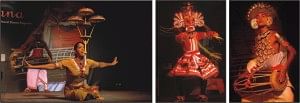An introduction to Sri Lankan rhythm and dance

Performers of the Sri Lanka Army Dance Troupe at the programme. Photo: Mumit M.
Bangladeshis are not that familiar with Sri Lankan culture -- dance, music, traditions and such -- despite the latter being a neighbour and a SAARC member.
Thanks to the Dhaka wing of Seva Vanitha -- a non-profit, non-political organisation -- and the High Commission of Sri Lanka in Dhaka, traditional Sri Lankan dance made its first appearance in the city on May 22. The event titled "Lakrangana", featuring performances by the dance troupe of Sri Lankan Army, was held at the Grand Ballroom, Radisson Water Garden Hotel. The show was sponsored by ABN Group.
Apart from offering a novel cultural experience, the programme was held for a charitable purpose -- proceeds from ticket sales went to the Dhaka Ahsania Mission Cancer and General Hospital.
In her speech, Rajes Krishnamoorthy, president of Seva Vanitha-Dhaka spoke briefly about the organisation and the cultural programme. She said, "Seva Vanitha was founded in Sri Lanka in 1983 to promote and enable women to participate in national development programmes. The Dhaka unit of the organisation consists of female staff members, spouses of staff members of the Sri Lankan High Commission and Sri Lankan expats (women) in Bangladesh.
"This cultural programme, Lakrangana, also commemorates the 60th anniversary of Sri Lankan Independence."
Chief guest Nicole S. Chowdhury, wife of Adviser to the Ministry of Foreign Affairs Iftekhar Ahmed Chowdhury, said, "Sharing one's art with others has a way of bonding people of different nations, bridging the gaps of isolation and linking them by a sense of participation and friendship.
"In the vast Asian tapestry, adorned by diverse and colourful traditions, we, Bangladesh and Sri Lanka, are etched partners sharing common threads of a vibrant heritage."
The programme was well attended by foreign delegates, including the Sri Lankan High Commissioner, V Krishna- moorthy.
Dr. Silverine De Silva, a member of Seva Vanitha-Dhaka, was the MC.
The origin of Sri Lankan dances goes back to indigenous tribes and Yakkas (demon worshippers). According to Sinhalese legend, Kandiyan (Kandy was the last royal capital of Sri Lanka) dances originated about 2500 years ago, from a ritual that broke the spell cast on a king.
The classical dance forms are associated with rituals and ceremonies originating from folk traditions going back to times before the advent of Buddhism in Sri Lanka in the third century B.C.E.
The Sri Lankan troupe began with Magul Bera (ceremonial drums). According to customs, every auspicious occasion is heralded by Magul Bera, to invoke divine blessing.
Next was Puja Netuma, performed as homage to Sarasvathi, the goddess of arts. The dance is a fusion of low and up country styles.
A performance of Naga Raksha dance followed. The performance was a stage adaptation of a ritualistic dance form from the southern part of Sri Lanka. The ritual was intended to bridge the gap between the human world and that of the gods and demons. The dancer in crimson, wearing a mask -- a huge snake head with seven hoods -- started with subtle movements and gradually, as the beats of the drums picked up, swirled and twirled as if he was possessed by some force from the nether world.
The next performance, Gajaga Vannama, depicted the rhythmic, majestic tread of an elephant. Hansa Vannama -- a Sri Lankan "swan dance"-- featured graceful movements with fitting rhythm.
The drummers were highlighted in Pancha Thuirya Vadanaya (the drum orchestra). The drum has been the king of instruments and 20 types of drums are used in Sri Lanka. The performance featured Atata (playing drums with hands); Vithatha (playing drums with sticks); Atata-Vithatha (using hand and stick); Ghanya (instruments made of metal) and Shushira (wide instruments like flute or the Sri Lankan trumpet, horanewa).
The dances, rhythm, instruments, costumes were all new to the Bangladeshi audience; performances were greeted with enthusiastic applause.
The second performance of Lakrangana was held yesterday at the International School Dhaka auditorium. Lakrangana will be staged at the Chittagong Club auditorium today.

 For all latest news, follow The Daily Star's Google News channel.
For all latest news, follow The Daily Star's Google News channel. 



Comments